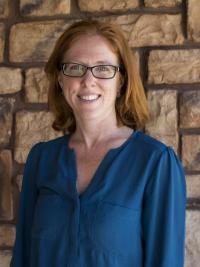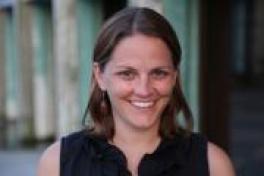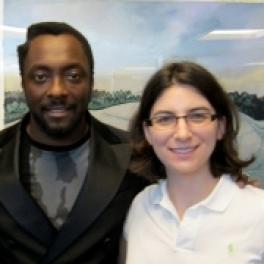Careers in Folklore
Folklorists work in a variety of settings, including various academic departments in colleges and universities, libraries, museums, archives, historical associations, arts councils, the publishing industry, funding agencies, and the federal government, to name a few. But how does one get started in a folklore career? What professional avenues are there for the folklore scholar? Read below for examples and information.
OSU Graduates at Work
Sheila Bock

Dr. Sheila Bock received her Ph.D. in 2010 in the Department of English with a focus on Folklore Studies, and she is now Assistant Professor of Interdisciplinary Studies at the University of Nevada, Las Vegas. Teaching courses on Interdisciplinary Research Methods and Interdisciplinary Inquiry, she enjoys introducing her students to the numerous applications of folklore theories and methods in problem-based research. She continues conducting research on the intersections between performance, narrative, and diabetes health education.
Kate Horigan

Dr. Kate Parker Horigan received her PhD in 2013 in the Department of English with a focus in Folklore studies. She served as a Visiting Lecturer at the Folklore Institute at Indiana University from 2013-2014, and is now Assistant Professor in the Department of Folk Studies and Anthropology at Western Kentucky University, where she teaches undergraduate and graduate classes such as Supernatural Folklore, Field Methods in Ethnography, and Folklore Genres. Dr. Horigan continues to be interested in vernacular responses to disaster and conflict, as well as applications of this research. Her forthcoming book is titled Consuming Katrina: Public Disaster and Personal Narrative (UP Mississippi, 2018). Her current research explores memory and narration of war and genocide in Bosnia (1992-1995), especially among Bosnian refugees in Bowling Green, KY.
Anne Henochowitz

After earning her M.A. in Chinese literature and a GIS in folklore, Anne is the Senior Analyst for Chinese Social Media at the Department of State Bureau of International Information Programs. She provides reports on trends in the Chinese media and Internet for Washington and Beijing. She is also involved in broader social media projects, such as tweeting during the "night shift" for Amb. Roos in Tokyo after Japan's devastating tsunami. After work, she heads the Washington chapter of Wokai, a China-focused microfinance organization. From promoting cultural exchange to following Chinese Internet memes, folklore is a part of her daily work.
Here's a photo of me with will.i.am of the Black-Eyed Peas. He's supporting the 100,000 Strong Initiative, a State Department program that aims to send 100,000 Americans to study in China by 2015.
Undergraduate Study
Becoming a folklorist typically begins with college courses designed to introduce and familiarize students with general theoretical concepts about the study of folklore, and to begin honing skills such as intercultural communication and ethnographic description. Folklore majors are trained to study specific cultural traditions, whether regional, occupational, or ethnic in nature. This training is excellent preparation not just for graduate work in any of the humanities or social sciences, but also for going directly into the corporate world.
Increasingly, businesses and industries, marketing firms, departments of tourism, public programming agencies, health care professionals, and political organizations are learning how to deal with internal and external diversity; the job market today demands individuals to possess the skills and abilities necessary to be successful in the new global marketplace. Folklorists have been instrumental in the planning and presentation of public and corporate exhibitions and festivals. In addition, folklorists have been hired to report and make recommendations relating to urban planning, school curricula, teacher training programs, and community educational and recreational programs. Your skills as a folklorist will allow you to adapt to new communicative environments, and no kind of work is insulated from this need.
Graduate Study
Folklorists speak of three overlapping realms of practice: academic, applied, and public. For jobs in these three fields, a master's degree is minimally required. Opportunities are varied and expanding for someone prepared to think creatively. You must become expert at articulating what you do to a lay audience, and will often use your ethnographic and narrative skills to situate yourself in places where no folklorist has gone before.
Graduate students should think carefully about the ethical and political implications of the kind of work you plan to do. Folklore scholarship has a checkered history: it has been used to legitimate fascist regimes and also to make human rights claims; to assist military intelligence in waging war against indigenous populations and also to promote intercultural understanding. The material we study is not our creation or property, as mathematics is of the mathematicians. Indeed, folklore scholars are a tiny minority among the people who study and document folklore–that is, their own culture. We need to consider our intellectual, moral, and material debts to our informants, as well as their proprietary rights in the "data," and the consequences of making in-group knowledge public.
Academic:
It is difficult to find positions in folklore per se. Most academic folklorists are tenured in departments such as English or area studies. It's smart to combine graduate work in folklore with a second discipline, so that you'll have demonstrated competence in more than one area. Developing a strong resume of activities, presentations and publications is important to achieving professional success. Graduate students hoping to continue in academia are encouraged to join professional organizations, such as the American Folklore Society. Strive to contribute to the on-going scholarly conversations by presenting your research; do the same in your other target field. Explore the increasing number of publishing opportunities for graduate students. Look for electronic discussion groups in your area of interest. All these things give you name recognition as well as ease and polish in your scholarship. Click here to see available national graduate programs in folklore.
Folklorists most frequently work in the following departments:
- Folklore. There are more departments and programs than you think; also, it doesn't hurt to think internationally.
- English and Foreign Language/Literature Departments. This is where most academic folklorists have ended up in the past. A new area to target is the number of cultural studies positions opening up in foreign language departments. See the special issue of the Journal for Folklore Research, "Folklore in the Academy: The Relevance of Folklore to Language and Literature Departments" (33:1 1996).
- Anthropology and Sociology. There is a growing need within the social sciences for graduates who conduct research within their own cultures and cultural traditions.
- Music.
- History and Art History. In the past, folklorists in history departments have primarily been scholars of American material culture and vernacular architecture, but increasing interest in cultural and radical history is creating wider opportunities.
- Women's Studies, African American Studies, American Studies, Popular Culture and other area studies and interdisciplinary programs.
- Education. With increasing attention to orality and literacy and to multiculturalism, folklorists have been finding a place here.
- Composition. Folklorists have had considerable success in basic writing and freshman composition as these fields develop an interest in vernacular literacies, personal narrative, and ethnographic writing.
- Medicine and Nursing. Folklorists trained in belief systems, religion, and bodylore teach culturally informed medical ethics, alternative medical systems, and the new field of "medical humanities." Such positions are being rapidly created in medical schools.
- Business. Folklorists have worked in the areas of small business, inner-city development, and corporate communications.
- Liberal Arts at community colleges. Folklorists have been especially effective with transitional students and also in interdisciplinary enrichment programs, such as Masters of Liberal Arts or Liberal Studies.
- Agriculture, Rural Sociology, and Extension. With new attention to local history and sustainable technologies and agriculture, folklife scholars have gained a niche.
Applied:
Outside the academy as well as in its professional schools and outreach programs, folklorists work as mediators between vernacular and institutional discourses and agendas, or apply folkloristic techniques and knowledge to social problems. See the new journal, Folklore in Use (ed. David Shuldiner) and such applied anthropology publications as Practicing Anthropology. For an example of folkloristic techniques applied in the professions, see Bonnie Blair O'Connor, Healing Traditions: Alternative Medicine and the Health Professions (Philadelphia: University of Pennsylvania Press, 1995) and Southern Folklore, special issue "Cultural Diversity in Medical Education" (54:2 1997).
Some applied folklore possibilities are suggested in the academic list above; others include:
- Public health. Folklorists undertake ethnographies of community practices, belief systems, and communicative norms in order to design more effective public information campaigns, preventive strategies, community resources, and means of treatment.
- Social work, especially in the area of refugee resettlement, from legal advocacy to technical assistance in marketing traditional arts, and in community conflict resolution.
- Paralegal. Folklorists have performed as expert witnesses, testifying to the careers of traditional artists for green card applications or explaining to a jury the difference between protective religious tattoos and gang insignia; from this experience, some are moving into paralegal work.
- Gerontology: folkloristic research on memory art, personal narrative, and life review has been influential in this field.
- Activism: labor unions, human rights organizations, neighborhood organizations, citizen campaigns.
Public:
Like the related radical tradition of activist folklore, public folklore has a long history in this country, most notably with the Federal Writers' Project of the 1930's. The Archive of American Folklife in the Library of Congress, the annual Festival of American Folklife produced by the Folklife Office of the Smithsonian Institution, and the NEA's National Heritage Fellowships testify to the continued government interest in folklore as national heritage.
Folklorists also work in a wide range of local arts and culture organizations, including:
- State and city arts and humanities councils
- National and state park commissions
- Museums
- Nonprofit public arts organizations
- Public radio and television
- Historic preservation commissions
Public folklorists produce exhibitions and publications, radio and film documentaries (some Oscar-winning), festivals and performances, and folklore curricula for the public schools. They need to learn administrative skills not ordinarily covered in a graduate humanities program (most learn on the job but wish they'd taken some courses) and they spend a great deal of time writing grants.
As public folklorists spend more time in the community, their productions are becoming more collaborative. Several provide technical assistance–grant writing workshops, equipment loans, documentation, work space and materials–to community organizations and performers so that they can maintain their traditions instead of simply having them recorded. With this community involvement, many nonprofit organizations in particular have taken a more activist stance.
The Public Programs Section of the American Folklore Society publishes an important newsletter with accounts of current projects; see also the following books:
- Robert Baron and Nicholas R. Spitzer, eds. 1992. Public Folklore. Washington: Smithsonian Institution Press.
- Burt Feintuch, ed. 1988. The Conservation of Culture: Folklorists and the Public Sector. Lexington: University Press of Kentucky.
- Mary Hufford, ed. 1994. Conserving Culture: A New Discourse on Heritage. Urbana: University of Illinois Press.
Resource Guide
In 2003, Laura Marcus, working for the Fund for Folk Culture and in collaboration with the American Folklore Society, compiled "Professional Development in Folklore: A Resource Guide for Graduate Students and New Professionals." This 35-page document has some valuable information for anyone wanting to read more about professional resources for folklorists.
Resource Guide [pdf]
[pdf] - Some links on this page are to .pdf files. If you need these files in a more accessible format, email cfs@osu.edu. PDF files require the use of Adobe Acrobat Reader software to open them. If you do not have Reader, you may use the following link to Adobe to download it for free at: Adobe Acrobat Reader.
